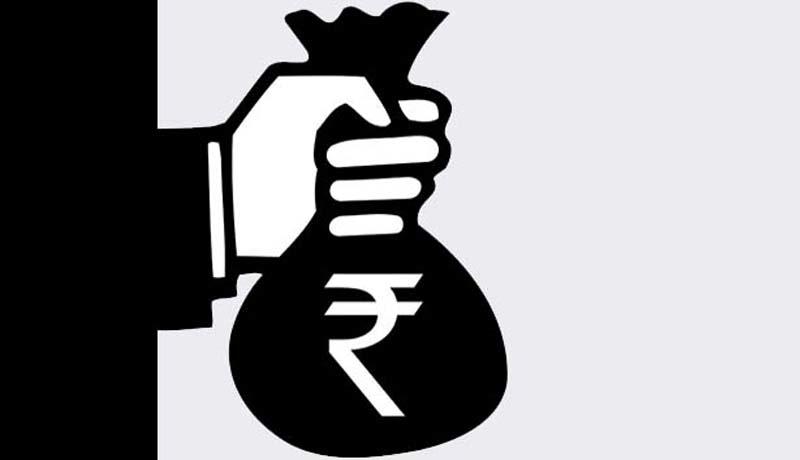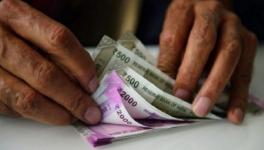India Tripping on Black Money in Tax Havens

Of late, black money has been occupying up quite a bit of column space in the newspapers. Demonetisation with its ostensible objective of combating black money has clearly failed. By now, enough commentators and experts have pointed out that only a small percentage of the black wealth is held in cash. Real estate, gold, commodity stocks, offshore deposits and financial instruments are some of the forms in which majority of the black wealth is held.
The release of Paradise Papers and earlier the Panama Papers highlight the importance of offshore financial holdings, as an important form of black wealth accumulation of India’s super-rich. It also brings out that not only is black money held as black wealth, a significant portion of it is also syphoned off into tax havens abroad.
There are various estimates of how much Indian black money is stashed abroad illegally, varying from 4 lakh (Global Financial Integrity) to 65 lakh crore (Black money and Tax Havens, R. Vaidyanathan). If we take an estimate by Bank of Italy somewhere in between the two, this places the black wealth syphoned off abroad between 8.9-10.5 lakh crores. This is a very high amount, nearly as much as 65% of India’s total currency that is in circulation. This is the money on which tax is not paid by the super rich, and explains the sharp rise in inequality throughout the country. It also explains why while companies are falling sick, and banks accumulating Non Performing Assets (NPA’s), the promoters are becoming richer and richer.
The risk to the Indian economy is not simply from black money going out – it is also this money coming back as illegal investments. A lot of the black money that goes out of India, comes back as apparently “white” money – through a process called ‘round tripping’.
Money Travelling on “Vacation” to Tax Havens
How does the round-tripping work? In the first leg of the ‘round tripping’, a corporate would over-invoice its imports. Through over-invoicing, the corporate would show to the Indian authorities that, the cost of inputs or equipment it purchased from abroad is much higher than what it really paid.
Let us take the case of Directorate of Revenue Intelligence (DRI) charges of over-invoicing against the two of Adani’s power companies. DRI accused Adani Power Maharashtra and Adani Power Rajasthan of inflating the costs of power equipment by 400%.
Both the Adani companies bought power equipment from manufacturers in South Korea and China. The equipment was shipped directly from ports in China and South Korean to a port in India. But, on paper, the power equipment was shown to be bought by a Dubai company -- controlled by Mr Adani’s brother through a shell company located in Mauritius -- from South Korea and China at the original price. The two Adani power companies, in turn, were shown to have purchased the same equipment from the Dubai company at a price, which is 400% of the original price. Through this over-invoicing, DRI alleged, Mr Adani generated Rs. 1,500 crore, which was diverted to Mauritius.
In another case of over-invoicing, DRI accused various power companies, including Adani and Essar, of inflating the cost of imported coal using a similar method – by using front companies located in Dubai and other places. This way DRI said these firms syphoned off Rs. 50,000 crore into accounts abroad.
It has been pointed by many that this is the manner in which companies like Adani, Essar and Reliance have siphoned off thousands of cores they have borrowed from Public Sector Banks, to off-shore tax havens. By inflating the price of capital equipment and coal, the power companies could falsely claim higher costs and losses, and therefore an inability to payback their loans. They can also evade taxes by claiming losses.
Under-invoicing is another important method through which corporates shift their black money abroad. This method is mainly used by exporters. For example, a software company which is exporting services to the US or Europe would show only part of its export proceeds on its books in India, by under-invoicing. The rest of the export income is billed by its front company in a tax haven and stashed away in banks and financial institutions abroad. This, essentially, is undeclared income on which taxes are not paid in India.
Together, over-invoicing of exports and under-invoicing of imports constitute the predominant ways in which Indian corporates shift their black money to off-shore tax havens.
A Global Financial Integrity (GFI) report estimates that about Rs. 1 lakh crore of black money goes out of India every year - through over and under-invoicing of imports and exports. GFI calculated this amount based on the discrepancies in Balance of Payments (BoP) data. The actual illegal flows could be of much higher order.
The trip back home
These illegal outflows of black money to off-shore tax havens do not simply hibernate there. There is a second leg of the Round Trip which begins from these tax havens.
Corporates which have stashed away their illegal wealth in various shell companies in the tax havens like Mauritius, route this money back to India, mainly in the form of Foreign Direct Investment (FDI) and Foreign Portfolio Investment (FPI).
Investment from tax havens like Singapore and Mauritius are exempt from capital gains tax and various other taxes in India. As a result, the black money stashed abroad can be brought back into India as foreign investment, using front companies located in Singapore and Mauritius. Corporates, quite often, invest their offshore black money as foreign private equity, into their own companies – thereby turning their black wealth into white.
Data on foreign investment shows that year after year, the source of 50% of the FDI that comes into Indian are just two tax havens – Singapore and Mauritius. In the year 2016 -17, India received FDI worth about Rs. 3 lakh crores. Out of this, Rs. 1.6 lakh crore came from Singapore and Mauritius. It is widely held that a large chunk of FDI from these two countries is actually Indian black money that is being round-tripped.
For example, in 2015, Reliance Industries Ltd. (RIL), owned by Mukesh Ambani was accused of bringing in Rs. 6,500 crores as anonymous FDI into his group, using a shell company based in Singapore. It was alleged that the Rs. 6,500 crore was taken out of India, through the over-invoicing of equipment of RIL’s KG-Basin gas project. RIL is accused to have siphoned off thousands of crores of rupees, which right fully belonged to the Indian government, by artificially inflating the capital costs through over-invoicing.
Apart from FDI, a substantial chunk of India’s off-shore black wealth is also brought back into the country in the form Foreign Portfolio Investment -- foreign investment in share markets, securities and derivatives.
The latest SEBI data shows that at present there is Rs. 8 lakh crore of FPI, from Singapore and Mauritius, invested in Indian equity and debt markets. A significant part of this 8 lakh crores is black money round-tripping back to India.
The story of round-tripping is intimately tied to the so-called liberalisation and globalisation policies followed by every government for the past two decades. The scant restrictions on imports and active promotion of exports led to growth by the governments in the era of globalisation, make it easy for corporates to evade taxes, and allow them to add billions of rupees to their net worth. The increasing openness to financial flows, active encouragement of foreign investment in the economy, further exacerbates the problem, where the black money can go in and out of the country with total freedom, in the guise of international financial flows. This process denies India's government tax revenues worth lakhs of rupees, aborts India’s development investments, and increases India’s vulnerability to a global financial crisis.
Get the latest reports & analysis with people's perspective on Protests, movements & deep analytical videos, discussions of the current affairs in your Telegram app. Subscribe to NewsClick's Telegram channel & get Real-Time updates on stories, as they get published on our website.
























